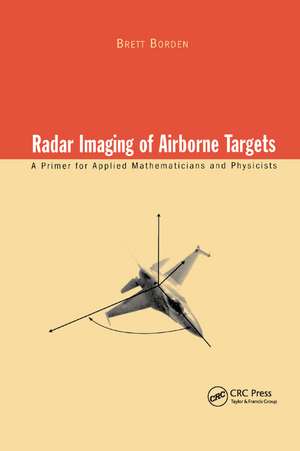Radar Imaging of Airborne Targets: A Primer for Applied Mathematicians and Physicists
Autor Brett Bordenen Limba Engleză Paperback – 17 oct 2019
Enabling an understanding of the subject and its current mathematical research issues, Radar Imaging of Airborne Targets: A Primer for Applied Mathematicians and Physicists presents the issues and techniques associated with radar imaging from a mathematical point of view rather than from an instrumentation perspective. The book concentrates on scattering issues, the inverse scattering problem, and the approximations that are usually made by practical algorithm developers. The author also explains the consequences of these approximations to the resultant radar image and its interpretation, and examines methods for reducing model-based error.
| Toate formatele și edițiile | Preț | Express |
|---|---|---|
| Paperback (1) | 489.26 lei 6-8 săpt. | |
| CRC Press – 17 oct 2019 | 489.26 lei 6-8 săpt. | |
| Hardback (1) | 1272.44 lei 6-8 săpt. | |
| CRC Press – 1999 | 1272.44 lei 6-8 săpt. |
Preț: 489.26 lei
Preț vechi: 575.60 lei
-15% Nou
Puncte Express: 734
Preț estimativ în valută:
93.62€ • 98.01$ • 77.46£
93.62€ • 98.01$ • 77.46£
Carte tipărită la comandă
Livrare economică 07-21 aprilie
Preluare comenzi: 021 569.72.76
Specificații
ISBN-13: 9780367400026
ISBN-10: 0367400022
Pagini: 158
Dimensiuni: 156 x 234 x 10 mm
Greutate: 0.45 kg
Ediția:1
Editura: CRC Press
Colecția CRC Press
ISBN-10: 0367400022
Pagini: 158
Dimensiuni: 156 x 234 x 10 mm
Greutate: 0.45 kg
Ediția:1
Editura: CRC Press
Colecția CRC Press
Cuprins
PREFACE INTRODUCTION Brief History of Radar Contemporary Issues in Radar Imaging Overview RADAR FUNDAMENTALS Radar Signals Radiation Condition The Radar Equation Atmospheric Windows Radar Data The Ambiguity Function Radar Measurement Systems SCATTERING MODELS The Magnetic Field Integral Equation for a Perfect Conductor The Weak Scatterer and High-Frequency Limits Dielectric Scatterers The (Approximate) Radar Scattering Model ONE-DIMENSIONAL IMAGING Range Profiles Ill-Posed Problems and Regularization Resolution Improvement Methods Bayesian Methods Model-Based Resolution Improvement TWO-DIMENSIONAL IMAGING The Basic Imaging Equation Data Errors Resolution Improvement Signal Diversity Radar MODEL ERRORS AND THEIR EFFECTS Template-Based ATR Unresolved Scatterers and Scintillation Non-Weak and Dispersive Scatterers Corrective PSF Ducts and Cavities THREE-DIMENSIONAL IMAGING Angle Tracking, Scintillation and Glint Angle-of-Arrival Imaging High-Frequency Zeros Statistical Methods OTHER METHODS Resonant-Frequency Poles Polarization Target Structure-Induced Modulations Wide Band Radar Future Efforts APPENDIX: ILL-POSED PROBLEMS Compactness of a Set and Compact Operators Singular Value Decomposition Least-Squares Solutions and Ill-Posedness BIBLIOGRAPHY INDEX Each chapter contains References.
Descriere
Enabling an understanding of the subject and its current mathematical research issues, Radar Imaging of Airborne Targets: A Primer for Applied Mathematicians and Physicists presents the issues and techniques associated with radar imaging from a mathematical point of view rather than from an instrumentation perspective. The book concentrates on scattering issues, the inverse scattering problem, and the approximations that are usually made by practical algorithm developers. The author also explains the consequences of these approximations to the resultant radar image and its interpretation, and examines methods for reducing model-based error.












